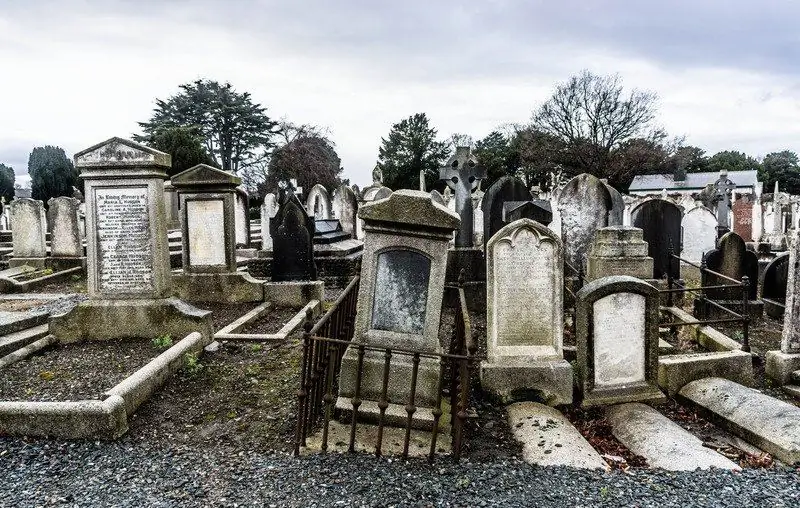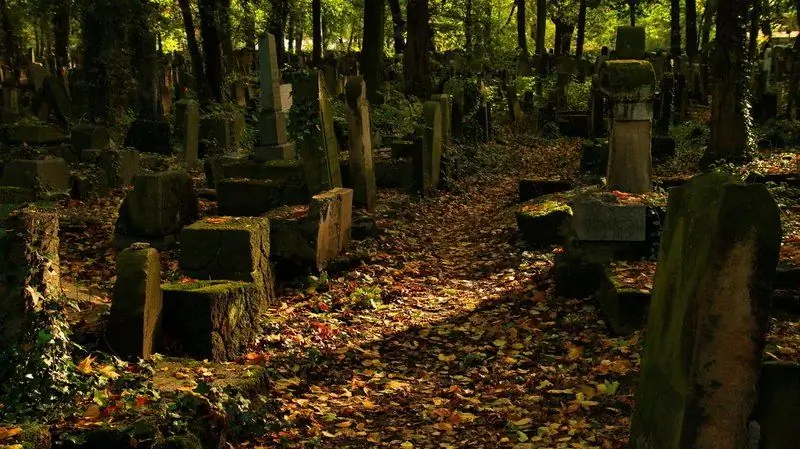
Table of contents:
- Author Bailey Albertson albertson@usefultipsdiy.com.
- Public 2023-12-17 12:53.
- Last modified 2025-01-23 12:41.
Why you can't touch other people's graves when you're in a cemetery

There is an opinion among the people that it is impossible to touch and clean up other people's graves. But what if, next to your site in the cemetery, someone has not cleaned the grave of a deceased relative for a long time, and the grass and weeds from it began to climb over the fence? Is it possible to clean up on other people's graves and what does the church think about it?
Is it possible to clean up on someone else's grave
Signs and superstitions will unequivocally say - no, you can't. There are many reasons for this: the deceased will suck out your energy in a vampiric way, you will bring the time of your own death closer, and the dead person may also think that you are not cleaning, but stealing from him, and come to take revenge. What they can think of! However, all this is nothing more than empty superstitions invented by the people on the basis of unscientific and non-religious correspondences. We will direct all those interested in history and the reasons for the emergence of superstitions to the book "The Golden Bough", written by J. Fraser. And further we will brush them aside, since omens do more harm than good.
The main rational argument against caring for someone else's grave may be the dissatisfaction of the living relatives of the deceased. Perhaps they will not like the fact that other people are in charge of their relative's last refuge. Therefore, before doing a good deed, try to make inquiries about the deceased and about those who could care for his grave.

When cleaning someone else's grave, be especially careful so that suddenly announced relatives are not offended by you
The opinion of the Orthodox Church on this topic is more interesting, since it is based on the Christian worldview. To begin with, caring for an abandoned grave is a good thing in itself. This will help preserve a good memory of a person whom everyone has already forgotten about. Priests do not discourage, but, on the contrary, encourage such activities.
Next, we can recall the concept of a limb. It is still not completely established in the churches (both Orthodox and Catholic), and from time to time it becomes not dogmatic, then it comes back into circulation. Almost all souls fell into the limb, with the exception of the most beneficent (they were sent directly to heaven) and the most wicked (these comrades immediately went to hell after death). In the limbo, souls awaited the Last Judgment, undergoing punishment for the sins committed during their lifetime. And these punishments decreased as the living people mentioned the deceased in their prayers.
How does this have to do with cleaning the grave? Tidying up on the last refuge, you somehow render a service and remember the deceased person. Therefore, from the point of view of Christianity (although this point of view changes from time to time), such an action can reduce the suffering of the soul in the limbo. If you are a Christian, then prayer for the soul of the deceased will not be superfluous. And cleaning will support prayer with a good deed.

Limb as a concept has been very common since the 13th century, but in 2007 the Catholic Church rejected this idea, emphasizing that it was created already in the Middle Ages.
Cleaning other people's graves, both from the point of view of the Russian Orthodox Church and from the general human point of view, is not something bad or forbidden. If you want to do a good deed and put things in order on a grave overgrown with weeds, then let no superstitions stand in your way. The main thing is to be careful not to break something inadvertently. The deceased is unlikely to rise to take revenge, but his relatives may be unhappy.
Recommended:
Why You Can't Why You Can't Wash Floors On Friday: Signs And Facts

Why you can't wash floors on Friday: signs and superstitions. The opinion of the mystics and Orthodoxy
Why You Can't Step On Graves In A Cemetery And What Will Happen If You Break The Ban

Why you can't step on graves in a cemetery: superstition, church opinion, and rational reasons
Why You Can't Leave Food On The Graves In The Cemetery

Why you can't leave food in the cemetery: superstition, church opinion, rational reasons
Why Salt Is Poured On The Graves In The Cemetery

Who and why can sprinkle salt on the graves in the cemetery and how does the church relate to such actions
Why You Can't Go To The Cemetery In Sandals And Other Open Shoes

Why you can't go to the cemetery in sandals. Signs and superstitions, the opinion of the church, the logical explanation of the prohibition
